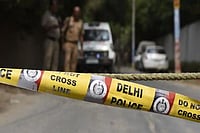Delhi's air quality remained in the 'very poor' category on Monday morning and the city recorded a minimum temperature of 15 degrees Celsius, a notch below the season's average.
With pollution levels worsening, the Centre's air quality panel has directed the authorities to impose a ban on construction and demolition activities in the Delhi-NCR, except in essential projects, and other curbs under stage III of the Graded Response Action Plan.
The relative humidity at 8.30 am stood at 90 per cent, officials said. The weatherman predicted mainly clear skies for the day with the maximum temper likely to settle at 32 degrees Celsius.
What is GRAP?
GRAP is a set of anti-air pollution measures followed in the capital and its vicinity according to the severity of the situation.
It classifies the air quality in the Delhi-NCR under four different stages: Stage I - "Poor" (AQI 201-300); Stage II - "Very Poor" (AQI 301-400); Stage III - "Severe" (AQI 401-450); and Stage IV - "Severe Plus" (AQI >450).
Also Read | Explained: How Does The GRAP Help Combat Air Pollution In Delhi NCR?
What's causing the AQI to shoot up?
The Delhi-NCR region witnesses high levels of air pollution in the winter months every year owing to a host of factors and the latest notification is not a one-off issue. Being a landlocked area, the region’s geography regularly exacerbates the problem of pollution.
Other factors such as rising population and vehicular traffic, unplanned urban development, unscientific waste disposal, fossil fuel combustion, stubble burning in the neighbouring agricultural states, and use of firecrackers are also significant contributors to pollution.
Notably since the eve of Deepavali, Delhi’s AQI has hovered between very poor and severe categories. Furthermore, up until October 27, the neighbouring state of Punjab reported nearly 9,000 incidents of stubble burning.
(With inputs from PTI)


























